12/5/2014
Baltimore, Maryland Inspector General Blasts Lack Of Camera OversightReport shows potential bribery and mismanagement led to thousands being falsely accused by speed cameras in Baltimore, Maryland.

Speed camera vendors in Baltimore, Maryland went wild, and city officials did nothing about it, according to a report released Wednesday by the city's office of the inspector general (OIG). Up to a third of the speed camera tickets issued by some cameras were found questionable or outright erroneous in past program audits. The latest inquiry concludes this was more than ordinary mismanagement as a top city official engaged in "inappropriate activity" to favor a camera vendor.
Baltimore officials did not want this investigation to go forward. City police refused interviews with investigators. The transportation department did not release any documents until October. Camera vendor Brekford would not cooperate in any way, and Xerox only provided cursory responses.
"The difficulty the OIG experienced in obtaining required documentation, reliable data, and access to key personnel for interviews from vendors and city agencies unfortunately resulted in important questions about the ATVES [traffic camera] program remaining unanswered," the report explained.
To highlight the issue, investigators asked three different city departments how much revenue the camera program had collected. The transportation department said $114 million. The finance department said $107 million. The information technology department said $65 million. More than just the accounting proved to be slapdash, as the report identified the source of widespread ticketing of innocent motorists.
"Xerox contended that several citations issued erroneously throughout the ATVES program were a result of what the radar industry refers to as 'known radar effects,'" the report explained. "One example of known radar effects involved large flat-backed trucks being cited for unreasonably high speeds. It was revealed that the large flat backs of these trucks combined with the angle at which certain speed enforcement units were positioned caused the equipment to register the vehicle as traveling at a speed much greater than its actual speed."
The report also noted that several vehicles that were stopped at red lights were nonetheless sent automated speeding tickets because "multiple vehicles and cross traffic" created erroneous readings. Vendors knew about these problems, but they sent the tickets anyway knowing recipients would most likely pay them to avoid the hassle of a court challenge.
Vendors forwarded tickets to the city police for "review" at the rate of 2500 tickets per day. A pair of officers spent about three hours on review each day -- the equivalent of nine seconds of attention given to each ticket.
"The OIG believes that nine seconds is an inadequate amount of time to properly review and approve a citation," the report concluded.
Xerox and Brekford had no incentive to perform a diligent review, either, because these vendors were paid on a per-citation basis.
"This payment structure, known familiarly as a bounty system, creates an opportunity for abuse of the program," the report concluded. "The very nature of the bounty system creates the incentive for vendors to increase the number of citations issued to increase revenue. This incentive to increase citation volume has the potential for emphasizing revenue demands at the expense of quality control efforts."
There was little desire to change the system, as the mayor's chief of staff at the time, Alexander M. Sanchez, appeared to have a cozy relationship with vendor Xerox. Records showed that Sanchez spoke with Xerox lobbyist Sean Malone up to ten times each month. The inspector general produced a detailed timeline and excerpts from emails as evidence that Sanchez interfered with the speed camera contract process.
"COS Sanchez also issued directives in direct contrast to the procurement team's decisions in an apparent effort to steer the contract award to Xerox," the report concluded. "In doing so, the OIG has determined that COS Sanchez knowingly used the influence of his office to benefit the best interests of Xerox contrary to the interests of the city and taxpayers."
Sanchez resigned in May, but the inspector general believes a number of questions about his conduct remain unanswered. The inquiry did not look into or find whether Sanchez received anything of value in return for his alleged conduct.
A copy of the inspector general report is available in a 600k PDF file at the source link below.


